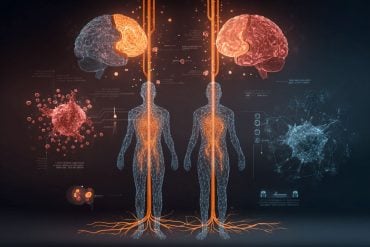Summary: Emerging research underscores the profound connection between mental health and heart disease, with depression and anxiety hastening the onset of cardiovascular risk factors.
Findings from two preliminary studies suggest that psychological conditions not only distress the mind but also have tangible effects on physical health, potentially leading to heart attacks or strokes.
These studies demonstrate the acceleration of risk factors like high blood pressure and diabetes in individuals with depression and anxiety and highlight the importance of early and frequent cardiovascular screenings for those with mental health issues.
Key Facts:
- Anxiety and depression can speed up the development of cardiovascular disease risk factors, bringing forward the onset by an average of six months.
- People with depression or anxiety have a roughly 35% increased risk of major cardiovascular events like heart attacks and strokes.
- Higher cumulative stress is linked to a 22% increased risk of atherosclerosis and a 20% increased risk of overall cardiovascular disease, regardless of traditional risk factors.
Source: American Heart Association
The heart and mind are strongly connected, with depression, anxiety and chronic stress all increasing the risk for heart and brain health complications, according to two preliminary studies to be presented at the American Heart Association’s Scientific Sessions 2023.
The meeting, to be held Nov. 11-13, in Philadelphia, is a premier global exchange of the latest scientific advancements, research and evidence-based clinical practice updates in cardiovascular science.
Mental health conditions, including depression, anxiety and stress are known to increase the risks for poor heart health, according to the American Heart Association and in two new studies, researchers measured how much one’s mental state affects heart health.
“There are clear associations between psychological health and cardiovascular disease risk. These studies add to a growing body of data we have on how negative psychological health can increase the risk of heart and brain disease,” said Glenn N. Levine, M.D., FAHA, writing committee chair of the American Heart Associations’ 2021 Psychological Health, Well-Being, and the Mind-Heart-Body Connection scientific statement.
Depression and anxiety accelerate the rate of gain of cardiovascular risk factors: mechanism leading to increased risk of cardiac events (MDP274)
The first study examined the mechanism by which the mental state affects heart health. Researchers found that anxiety and depression sped the development of new cardiovascular disease risk factors.
“While it is known that depression and anxiety increase the risk of cardiovascular disease, such as heart attack and stroke, the mechanism underlying this is not completely known,” said lead study author Giovanni Civieri, M.D., a research fellow at the Cardiovascular Imaging Research Center at Massachusetts General Hospital and Harvard Medical School, both in Boston.
“In our study, we identified a mechanism that appears to largely account for the link between these psychological factors and cardiovascular disease.”
Civieri and colleagues studied data from adults enrolled in the Mass General Brigham Biobank in Boston with no previous heart events. The time required to develop a new cardiovascular risk factors was measured over 10 years of follow-up.
Researchers found:
- 38% of all participants developed a new cardiovascular risk factor, such as high blood pressure, high cholesterol or Type 2 diabetes during the follow-up.
- Participants previously diagnosed with anxiety or depression developed a new risk factor on average six months earlier than those who did not have depression or anxiety.
- Depression and anxiety increased the risk for a major cardiovascular event, such as a heart attack or stroke, by about 35%.
- About 40% of the link between depression and/or anxiety and major heart and stroke events were explained by the accelerated development of cardiovascular disease risk factors.
- People with a higher genetic predisposition to stress developed the first cardiovascular risk factor at a younger age (on average 1.5 years earlier than those without the genetic marker).
“Developing cardiovascular risk factors more than six months earlier, over an average of five years is a lot,” Civieri said. “The fact that genetic analysis supported the clinical findings was intriguing and provided further confidence in our results.”
Researchers suggest that depression and anxiety might induce brain changes that trigger downstream effects in the body, such as increased inflammation and fat deposition.
The findings emphasize the importance of screening for cardiovascular risk factors among people with depression and anxiety.
“This study illustrates that health care professionals should be aware that negative psychological health — things like depression or anxiety — not only affect patient’s mental state of being, but also can impact their physical health and the risk for heart disease.
“So, these are not benign conditions,” said Levine, master clinician and professor of medicine at Baylor College of Medicine, chief of the cardiology section at the Michael E. DeBakey VA Medical Center, both in Houston.
“These are things we want to aggressively refer people to mental health professionals.”
Civieri also encouraged people with depression or anxiety undergo more frequent screening of their cardiovascular risk factors such as high blood pressure, high cholesterol and Type 2 diabetes.
“Although we did not investigate this aspect, it is reasonable to assume that treating depression and anxiety may reduce the accelerated development of cardiovascular risk factors,” he said.
Study background:
- The analysis was conducted using data on 71,262 adults, (average age 49, 45% men) and data were collected from December 2010 to December 2020.
- 16% of the study group were taking medications for depression or anxiety; however, statistical adjustment for such medications did not significantly impact results, Civieri explained.
- A genetic marker of stress sensitivity (polygenic risk score for neuroticism) was assessed for subjects who provided genetic data.
The observational study design and the possible misclassification of diagnostic codes for depression and anxiety are limitations to the study.
Associations of cumulative perceived stress with cardiovascular risk factors and outcomes: findings from the Dallas Heart Study (MDP100)
In a second, unrelated study, researchers explored the effects of cumulative stress on heart and brain health by examining responses to questionnaires completed by adults in the Dallas Heart Study who did not have existing cardiovascular disease.
“This unique study explored the relationship between our new cumulative stress score and its subcomponents on cardiovascular risk factors as an attempt to understand this relationship further,” said lead author Ijeoma Eleazu, M.D., a cardiology fellow at the University of Texas Southwestern Medical Center in Dallas.
“To our knowledge, this is the first study to provide such a multidimensional analysis of the relationships between perceived stress and cardiovascular disease.”
Over a one-month period, researchers integrated generalized everyday stress; psychosocial stress (stress prompted threats to psychological or social functioning); financial stress and neighborhood perceived stress into a score termed the “cumulative stress score.”
This novel score associated strongly and significantly with the development of cardiovascular disease after adjustments were made for known cardiovascular disease risk factors such as high blood pressure, Type 2 diabetes, smoking and high cholesterol, as well as adjustments for income and education, Eleazu explained.
Even after adjusting for risk factors such as high blood pressure, high cholesterol, smoking and Type 2 diabetes, as well as income and education, researchers found that higher cumulative stress was:
- associated with a 22% increased risk of atherosclerosis, in which plaque builds up in the arteries reducing adequate blood flow;
- associated with a 20% increased risk of overall cardiovascular disease; including coronary artery disease and heart failure;
- higher among women, people aged 18-45 and individuals with lower income and education levels, as well as among individuals who self-identified as Black or Hispanic adults.
In addition, cumulative stress scores were higher among those who reported racial/ethnic discrimination and lack of health insurance; and higher scores were also associated with high blood pressure, being overweight, being physically inactive and smoking.
“There are individual-level factors of perceived stress that comprised our psychosocial component of the score, as well as demographic factors that were represented in the financial stress score component, and even environmental factors that were represented in our neighborhood stress score component.
“These individual factors by themselves appeared to be less strongly correlated with cardiovascular outcomes than the multidimensional cumulative stress score,” Eleazu said.
“These findings suggest that we may not be capturing the impact of stress adequately when we only look at one factor or when we assess it broadly and/or subjectively. This is especially important among people in diverse or minoritized populations who may experience various types of and multiple stressors simultaneously.”
The analysis also indicates that ongoing stress raised the risk of poor heart and brain health in two ways: by directly influencing physical well-being, as well as increasing poor lifestyle behaviors such as smoking and being sedentary, which, in turn, lead to reduced cardiovascular health.
Previous research has shown that chronic stress can lead to elevated levels of stress hormones like cortisol, which, in turn, can affect blood sugar levels, inflammation and other biological chain reactions that impact the heart, Eleazu said.
“There is indeed a mind-heart connection. Taking care of your mind can impact your physical health as well,” she said.
“It would be great to see more patients talking with their physicians about their stress levels and more physicians screening for a high burden of stress in their patients. In that way, we can work together to combat poor outcomes.”
Levine added: “This novel concept of adding up and assessing someone’s cumulative stress is great, because in some aspects of our life we may not experience much stress, but in other aspects of our life, say finances or health, we may have a lot.
“This study found that it is best to look at a person’s overall cumulative stress — not just ask them about one aspect of their livelihood or life that could be affecting stress.”
Study background and details:
- Data evaluated was for 2,685 adults who did not have existing cardiovascular disease and participated in the Dallas Heart Study phase 2 (2007-2009), a multiethnic population-based group based in Dallas.
- The participants’ average age was 48 years; 55% were women; 49% were Black adults; and 15% of participants were Hispanic/Latino adults.
- Participants were followed for an average of 12.4 years, and cardiovascular events and deaths were judged by a panel of cardiovascular specialists.
Limitations of the study include there may have been unknown conflicting factors that were not considered and that the cumulative score is new and has not been fully validated, Eleazu explained.
About this mental health and cardiovascular disease research news
Author: Bridgette McNeill
Source: American Heart Association
Contact: Bridgette McNeill – American Heart Association
Image: The image is credited to Neuroscience News
Original Research: The findings will be presented at the American Heart Association Scientific Sessions 2023







